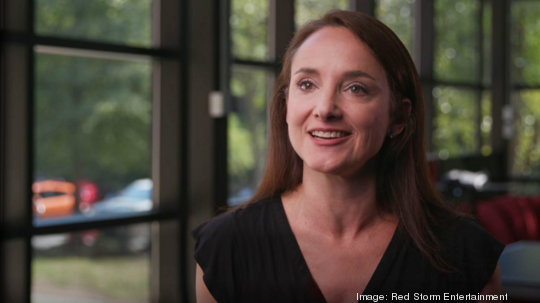
From aspiring sportscaster to the head of the Triangle's oldest video game studio, the career of Elizabeth Loverso, the newly-named managing director of Cary-based Red Storm Entertainment, has been anything but a straight line.
Loverso was named managing director of the studio last month. In an interview, she talks about her journey to the top, as well as how the Triangle can take advantage of industry buzz to create new jobs and opportunities in the sector.
Quietly, the video game studio in Cary has been putting out titles for decades. Founded in 1996 by a group that included author Tom Clancy, British Royal Navy Captain Doug Littlejohns and Creative Director Steve Reid, the first game, Politika, came out in 1997, with its best-selling Rainbow Six debuting a year later.
The titles have changed, as has the company’s ownership. In 2000, Red Storm was acquired by Ubisoft Entertainment. But until recently there was always one constant: Reid. It was Reid who for decades oversaw the creation of Tom Clancy brands like Rainbow Six and Ghost Recon. But after 21 years serving as the studio’s managing director, Reid is retiring at the end of the year.
In his stead comes Loverso, the newly-named managing director of Red Storm Entertainment. And she’s not skipping a beat, putting her project management skills to work to ensure a smooth transition.
From PR to project management
Loverso, formerly vice president of product development, has 28 years of expertise in production and talent management expertise. For the company, it’s a huge shift.
For Loverso, it’s the step she’s been preparing to take for her whole career – a career that began quite differently than those of her Triangle contemporaries. Tim Sweeney, CEO of Epic Games in Cary, started as a coder. As did Raleigh-based Epic Games veteran and former Boss Key Productions head Cliff Bleszinski, who was developing his own games when the major studio took a chance on his vision.
“I originally started out as a communications major,” Loverso says.
Loverso wanted to be a sports broadcaster on the nightly news. But college was humbling.
“I realized that normally the gigs you get are not the ones you see as the glamorous ones in sports broadcasting,” she said. “You have to be in the least popular markets or you’re the one standing in the hurricane reporting on the weather.”
So she adjusted her vision, turning to marketing and communications, envisioning a career in public relations.
She began her career as a production assistant at a firm called Acclaim Entertainment, which happened to work on titles such as NBA Jam Tournament Edition. And something clicked. She started to realize that her communication and project management skills “translate very, very well into production.”
While Loverso hadn’t envisioned running a video game studio while playing Pong on Atari as a child, she was suited for it. She found her sweet spot as a project manager and discovered that she “really loved” video games – specifically managing their development.
It opened up a career path that Loverso said would have been difficult to envision decades ago.
“Back then you didn’t realize that game development was a true career path,” she said. Video games “grew up in a garage.” While there were computer sciences programs, video games themselves weren’t a popular college pathway like they are now. And the people making games were entering through graphic design or coding – not project management.
Staffing studios of the future
Loverso said that in order to staff studios of the future, students need to see the opportunities available. And staffing studios of the future means reaching women – still the minority at most video game studios. That’s why at Red Storm the company is intentional about looking for opportunities to show girls and young women the “world of opportunities” in the industry. Loverso sees it as showing young people that games aren’t just for the artists and coders – “really trying to broaden their horizons and expose them to what the possibilities are.”
The hope is to attract some of the talent that is coming to the Cary area, which is developing a reputation as a mini-cluster for the video game space. Loverso said there are opportunities to expand the region’s prominence in the industry – specifically through esports.
“The more of these big events that come into the area, you’re attracting people who like to play games as well as the developers,” she said. “It’s really building upon that base.”
In the meantime, there’s a lot to do at Red Storm. In addition to traditional games, the studio is involved with Ubisoft Film & Television’s series “Mythic Quest” for Apple TV.